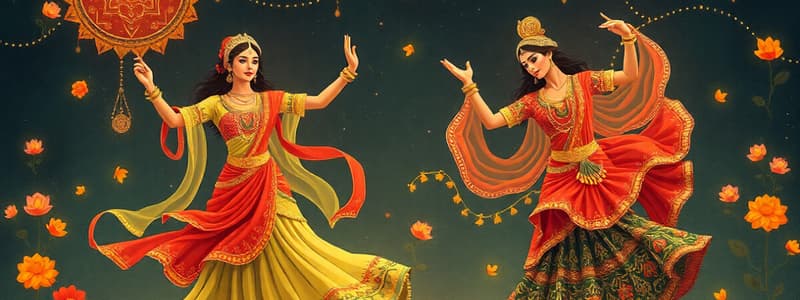Podcast
Questions and Answers
Pandit Birju Maharaj is a present ______ guru.
Pandit Birju Maharaj is a present ______ guru.
kathak
The symbol for Sama in taal-lipi is ______.
The symbol for Sama in taal-lipi is ______.
x
Kaal in taal-lipi is represented by the symbol ______.
Kaal in taal-lipi is represented by the symbol ______.
o
Tritaal consists of ______ maatras.
Tritaal consists of ______ maatras.
The number of taalis in Tritaal are ______.
The number of taalis in Tritaal are ______.
Flashcards
Pandit Birju Maharaj
Pandit Birju Maharaj
A renowned Kathak guru.
Guru Maneesha Sathe
Guru Maneesha Sathe
A Kathak Guru known for her expertise and contributions.
Sama (X)
Sama (X)
Symbolizes the first beat of a taal.
Kaal (O)
Kaal (O)
Signup and view all the flashcards
Tritaal
Tritaal
Signup and view all the flashcards
Study Notes
Introduction of Kathak Dance
- Kathak is one of the nine Indian Classical Dance styles
- Kathak is a North-Indian dance form
- Kathak originated in the "Ayodhyanathdhwara" temples
- The word Kathak comes from the word "Katha" which translates to story
- Kathak is known as the art of storytelling
- Kathak has 3 schools or Gharanas: Lucknow Gharana, Jaipur Gharana, Banaras Gharana
- Some characteristics of Kathak dance are the chakris or pirouettes/turns and the tatkaar or the footwork
Introduction of Taal Tritaal
- Taal Tritaal also known as Aaditaal, Teentaal
- It has 16 Maatras
- It has 4 Khanda, each of 4 maatras
- Sam occurs on the 1st Maatra
- Kaal occurs on the 9th Maatra
- Taalis occurs on the 1st, 5th, and 13th Maatra
Theka of Tritaal
- Na Dhin Dhin Na | Na Dhin Dhin Na |
- Na Tin Tin Na | Na Dhin Dhin Na | Na
- OR
- Dha Dhin Dhin Dha | Dha Dhin Dhin Dha |
- Dha Tin Tin Ta | Ta Dhin Dhin Dha | Dha
Definitions
- Laya means speed, rhythm, or tempo
- Laya is a continuous movement in space of time
- Music and dance is like a body without bones without laya
- Maintaining constant speed in the beats of a rhythm cycle is known as Laya
- There are 3 types of Laya: Vilambit, Madhya, and Drut
Types of Laya
- Vilambit Laya: It is a very slow tempo, half of Madhya Laya
- Madhya Laya: It is neither too slow nor too fast, it has a medium tempo
- Drut Laya: It is a very fast speed, it is double of Madhya Laya
Sam
- The first beat of Taal is called "Sam"
- Aavartan starts from Sam and ends on Sam
- When the dancer finally ends the composition on Sam, it is a peak of happiness
- Each time a composition ends on Sam, it ends in a beautiful manner
Maatra
- The scale by which Laya is measured is called Maatra
- Every Taal has a set number of maatras
- Maatras are demonstrated with our hands by clapping, using our fingers or by showing kaal
- Titaal has 16 maatras (beats)
Taali
- Taali means clap
- There are certain divisions of maatras in every Taal
- The first beat of some divisions (KhanDas) is shown with a clap except for the first beat of a specific khanda which is the kaal
- Tritaal has 3 taalis in one cycle, which are on the 1st, 5th, and 13th beat
Kaal/Khaali
- The first beat of a specific khanda, shown just by the right palm, is called khaali or kaal
- Usually, the second half of a taal begins with Kaal
- Kaal is shown by the palm of the right hand and not by clapping
- Tritaal has only one Kaal in one cycle which is on 9th beat
Tihai
- Tihai is a composition, which includes a set of syllables (bols) repeated thrice
- It ends on sam
- Tihai is generally a concluding composition
Vibhag
- A Vibhag is a natural division of any taal based on its Theka
- It can be showed with a clap or waving the hand as per the measurement
Names of Present Kathak Gurus
- Pandit Birju Maharaj ji
- Guru Maneesha Sathe ji
- Guru Rajendra Gangani ji
- Guru Shama Bhate ji
- Guru Prabha Marathe ji
- Guru Uma Dogra ji
Symbols of taal-lipi
- Sama is represented by: X
- Kaal (Khaali) is represented by: O
- Maatra is represented by: numbers
- Vibhaag (Khand) is represented by: |
- Yatii is represented by: (a curved line)
- Avagraha is represented by: S
Taall Information
- Tritaal has 16 Maatras
- Tritaal has 4 Khanda, consisting of 4 maatras each
- Sam occurs on the 1st maatra
- Kaal occurs on the 9th maatra
- Taalis occurs on the 1st, 5th, and 13th maatra
Studying That Suits You
Use AI to generate personalized quizzes and flashcards to suit your learning preferences.



